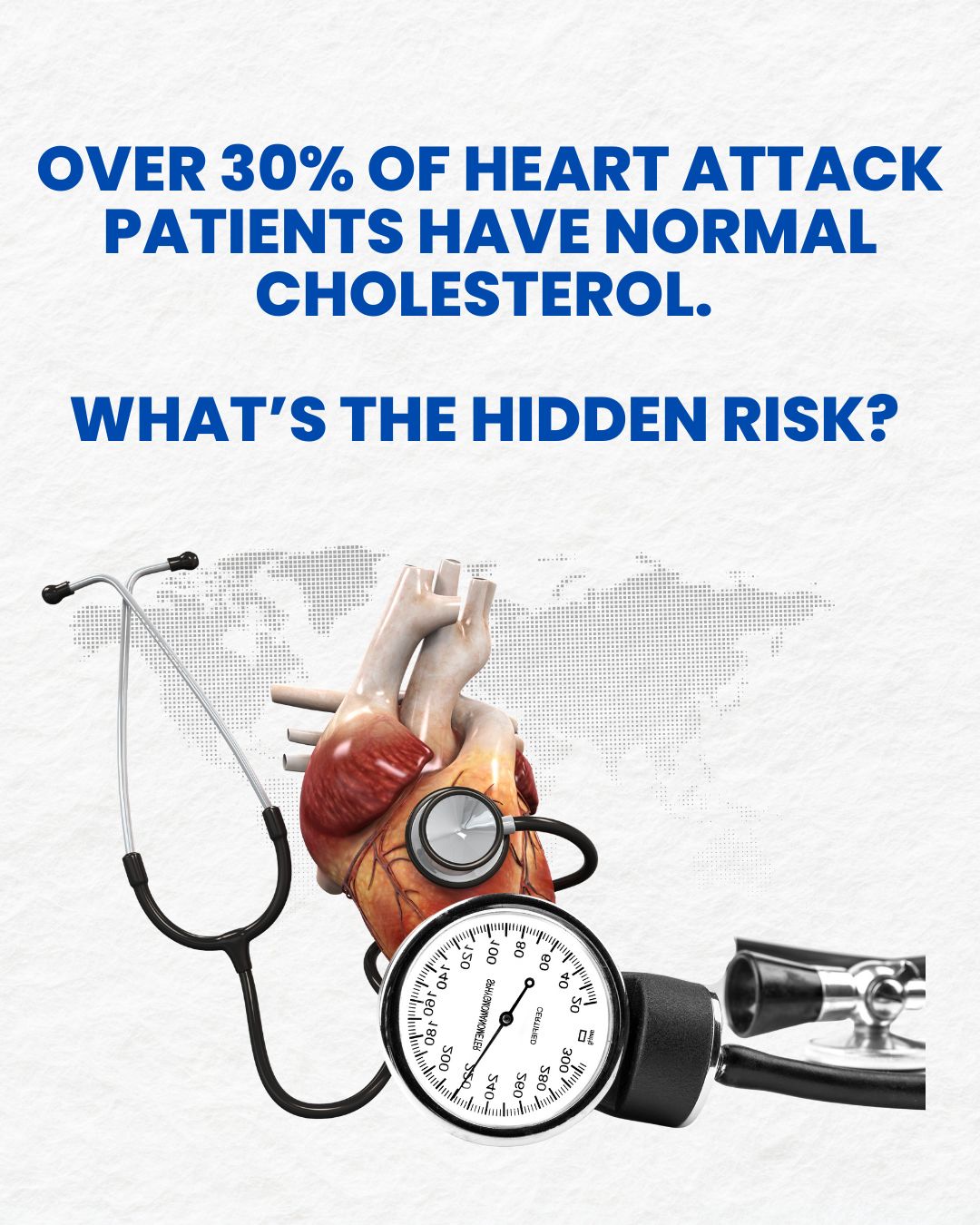Many people feel reassured when their cholesterol test comes back normal ✅. But what if you were told that over 30% of people who suffer heart attacks have normal cholesterol levels? One of the most overlooked culprits behind this is homocysteine, an amino acid that could quietly be damaging your heart 💔.
In this blog, we dive into what homocysteine is, why it matters, who should get tested, how to bring it down naturally, and its role in brain health 🧠 and pregnancy 🤰.
🧬 What Is Homocysteine?
Homocysteine is a sulfur-containing amino acid — a byproduct of methionine metabolism, which comes from protein‑rich foods. Under normal conditions, the body recycles homocysteine into other compounds (like methionine or cysteine) using B vitamins (B6, B12, folate) as cofactors in the methylation pathway. If there’s a deficiency in these vitamins or a genetic issue (e.g., an MTHFR gene variant), homocysteine can build up in the blood, a condition called hyperhomocysteinemia.
Genetic studies and observational data suggest that impaired methylation (such as in MTHFR polymorphisms) is strongly linked to elevated homocysteine and cardiovascular risk.
⚠️ Why High Homocysteine Is Dangerous
Elevated homocysteine isn’t just a lab number — it has real, clinically significant effects:
-
Endothelial damage: High homocysteine injures the inner lining of blood vessels (endothelium), making them more vulnerable to inflammation and atherosclerosis.
-
Oxidative stress: It increases free radical production, contributing to vascular inflammation.
-
Clot risk: It raises the likelihood of thrombosis (blood clots) due to its pro-coagulant action.
-
Atherosclerosis: By damaging vessel walls, it accelerates plaque buildup, increasing cardiovascular risk.
These mechanisms make elevated homocysteine an independent risk factor for:
-
Heart attacks
-
Strokes
-
Blood clots
-
Pregnancy complications
Meta-analyses of cohort and case‑control studies show that each 5 µmol/L increase in homocysteine is associated with a significantly increased risk of coronary heart disease.
Moreover, elevated homocysteine is not only linked to first-time cardiovascular events but also to long-term mortality: a meta-analysis found that high homocysteine levels significantly predicted cardiovascular and all-cause death.
🧪 Healthy Homocysteine Levels
| Risk Level | Homocysteine (µmol/L) |
|---|---|
| Optimal | 5–10 |
| Borderline High | 10–15 |
| High | > 15 |
Levels above 15 µmol/L (hyperhomocysteinemia) are considered clinically significant and warrant further evaluation.
👤 Who Should Consider Testing?
You might benefit from homocysteine testing if you:
-
Have a family history of heart disease or stroke
-
Experience unexplained fatigue, brain fog, or anxiety
-
Have normal cholesterol but other risk factors (e.g., hypertension)
-
Display B12 or folate deficiency symptoms
-
Are a vegetarian or vegan, with possible B12 deficiency
-
Have recurrent miscarriages or pregnancy complications
-
Suspect you may carry an MTHFR gene mutation
👥 Who Is at Higher Risk?
-
Vegetarians / Vegans – commonly get lower vitamin B12 from their diet
-
People with MTHFR polymorphisms – reduced methylation capacity
-
Older adults – poorer absorption of B vitamins
-
Individuals under chronic stress – stress can deplete B‑vitamin stores
-
Those with gastrointestinal issues – lower B‑vitamin absorption (e.g., in celiac disease or inflammatory bowel disease)
🧠 Homocysteine & Brain Health
High homocysteine doesn’t just impact the heart — it’s also linked to cognitive decline:
-
A consensus statement of international experts concluded that moderately elevated homocysteine (even within the “upper normal” range) is a modifiable risk factor for dementia and Alzheimer’s disease.
-
Observational data from community studies show that elevated homocysteine is associated with a greater risk of dementia or cognitive impairment; for instance, in a cohort of older Latino adults, those with higher homocysteine had a hazard ratio of ~2.4 for cognitive decline vs. lower levels.
-
Clinical trials lowering homocysteine with B vitamins (B6, B9, B12) in people with cognitive impairment have shown slower brain atrophy and reduced rates of decline, especially when baseline B‑vitamin status is optimized.
-
In dementia patients, studies have found negative correlations between homocysteine and B6, B12, folate levels, suggesting supplementation may be beneficial.
🤰 Homocysteine in Pregnancy
Elevated homocysteine is linked to several adverse pregnancy outcomes:
-
Studies have shown that women who go on to develop severe preeclampsia tend to have significantly higher homocysteine levels in early pregnancy compared to those who do not.
-
Elevated homocysteine has also been implicated in recurrent miscarriages and placental dysfunction, making it a relevant marker in preconception and high-risk obstetric care.
For women with a history of pregnancy loss, dietary B‑vitamin optimization (especially folate and B12) and homocysteine testing may be a valuable strategy.
🥗 How to Lower Homocysteine Naturally
Here are evidence-based strategies to reduce homocysteine:
-
Boost B‑Vitamin Intake
-
Eat folate-rich foods: dark leafy greens, lentils, beans.
-
Include vitamin B6 foods: chickpeas, potatoes, bananas.
-
Ensure vitamin B12: eggs, dairy, fortified foods — particularly important for vegetarians.
-
Under medical supervision, consider methylated B-complex supplements, especially if you have MTHFR variants.
-
-
Support Methylation
-
Eat choline‑rich foods (eggs, soy, cruciferous vegetables) to support methylation.
-
Limit alcohol and avoid smoking, as they deplete B vitamins.
-
-
Manage Lifestyle Stress
-
Practice meditation, yoga, and slow breathing to support methylation and reduce homocysteine.
-
Prioritize sleep — poor sleep disrupts methylation and B-vitamin metabolism.
-
-
Optimize Gut Health
-
Use digestive support (probiotics, gut‑friendly diet) to improve B-vitamin absorption.
-
Treat any gut conditions (like celiac disease or IBS) that impair absorption.
-
-
Hydration & Detox
-
Stay well hydrated — dehydration can concentrate homocysteine.
-
Avoid toxins that deplete B vitamins, such as excessive caffeine or certain medications.
-
-
Monitoring
-
Recheck homocysteine every 6–12 months if you’re making dietary or supplement changes.
-
Work with a healthcare provider to personalize supplementation, particularly if taking B vitamins.
-
✅ Lifestyle Support Beyond Diet
-
Exercise (strength + cardio): Supports vascular health, though not directly lowering homocysteine.
-
Omega-3 Fats: Fatty fish or plant-based omega-3s can reduce inflammation.
-
Personalized Supplementation: A targeted multivitamin or B-complex may help — but always under medical supervision, especially in pregnancy or genetic conditions.
❓ Frequently Asked Questions (FAQ)
Q1: Can homocysteine be elevated even with a healthy diet?
Yes — genetics (like MTHFR), stress, and poor absorption can lead to high homocysteine despite good nutrition.
Q2: Which foods are best to lower homocysteine?
Leafy greens, lentils, chickpeas, eggs, and fortified foods rich in B6, B9 (folate), and B12 are excellent.
Q3: Do I need supplements?
Not always, but if you have B-vitamin deficiencies, MTHFR mutations, or dietary restrictions (e.g., vegan), methylated B-complex may be recommended by your doctor.
Q4: How frequently should I test my homocysteine?
If you’re at risk, testing every 6–12 months is reasonable as you make changes.
Q5: Does exercise reduce homocysteine?
Not directly. But exercise improves heart health and supports risk reduction in conjunction with nutrition and stress management.
Q6: Is high homocysteine harmful during pregnancy?
Yes — linked to preeclampsia, miscarriage, and placental issues. Monitoring and B-vitamin optimization may be helpful.
Q7: Can children have high homocysteine?
It’s less common but possible in children with genetic methylation issues or vitamin deficiencies — pediatric evaluation may be needed.
✅ Conclusion
Homocysteine is a silently dangerous molecule — often overlooked when cholesterol is normal, but strongly linked to heart disease, stroke, cognitive decline, and pregnancy risks. The good news? It’s modifiable.
By combining:
-
🥗 Diet rich in B vitamins
-
💊 Targeted supplementation (if needed)
-
🧘 Lifestyle changes like stress reduction
…you can lower your homocysteine, protect your cardiovascular and brain health, and reduce long-term risk.
Ask your doctor about measuring homocysteine, especially if you have any risk factors.
📚 References
-
Wald DS, et al. Homocysteine and cardiovascular disease: evidence on causality from a meta‑analysis. J PubMed. 2002. PubMed
-
Wald DS, et al. Homocysteine level and coronary heart disease incidence: a systematic review and meta‑analysis. PubMed. 2008. PubMed
-
Peng HY, Man CF, Xu J, et al. Elevated homocysteine levels predict cardiovascular and all-cause mortality: a meta-analysis. PubMed. 2015. PubMed
-
Boushey CJ, Beresford SA, Omenn GS, Motulsky AG. Total plasma homocysteine and risk of cardiovascular disease: a meta‑analysis. PubMed. 1995. PubMed
-
Bazzano LA, et al. Effect of homocysteine interventions on cardiocerebrovascular events: meta‑analysis of RCTs. PubMed. 2006. PubMed
-
Smith AD, et al. Homocysteine and Dementia: An International Consensus Statement. PubMed. 2018. PubMed
-
Wright CB, et al. Homocysteine, B vitamins, and incidence of dementia and cognitive impairment in the Sacramento Area Latino Study on Aging. PubMed. 2007. PubMed
-
de Jager CA, et al. Homocysteine, B vitamins, and cognitive impairment – review of trials. PubMed. 2016. PubMed
-
Lamers SL, et al. Association between homocysteine and vitamin levels in dementia patients. PubMed. 2021. PubMed
-
Levine RJ, et al. Elevated plasma homocysteine in early pregnancy: risk for preeclampsia. PubMed. 2002. PubMed
-
Li M, et al. Homocysteine, B vitamins, and cardiovascular disease: Mendelian randomization study. PubMed. 2021. PubMed
-
Zhou Y, et al. Systematic review and meta-analysis: plasma homocysteine level and coronary heart disease risk. PubMed. 2022. PubMed

Akanksha Sharma
Dr. Akanksha Sharma, Head Writer and creator of AtoZ of Pregnancy, is dedicated to empowering women, parents, and families through 360-degree knowledge. She and her team provide evidence-based advice to guide families through pregnancy, parenting and beyond.






